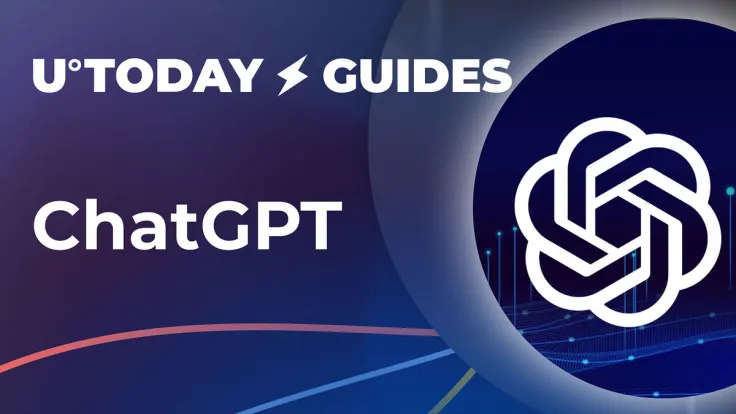
For many internet users, ChatGPT became the first-ever experience using no-code AI instruments. Thanks to an impressive kit of opportunities it unlocks, it rapidly made headlines in November 2022.
While excited users immediately stated that it would be able to replace any web developer and content creator, ChatGPT has its limitations. As such, is it a real game-changer? And how can it advance the cryptocurrency experience for newcomers and OGs in Web3?
ChatGPT is changing crypto sphere right now: Highlights
Since its launch in November 2022, the ChatGPT bot has been surrounded by heated debates over its role in the global digital ecosystem as well as debates about ethical, technical and commercial aspects of its usage.
- Developed by U.S.-based corporation OpenAI, ChatGPT is a text bot powered by artificial intelligence;
- ChatGPT is designed to answer questions using information from publicly available sources on the internet;
- Largely, ChatGPT became popular due to its ability to write simple code templates in different programming languages and to explain complex technical concepts in plain English;
- ChatGPT can be used for free, but only paid plans (starting from $23 per month) work during periods of maximum traffic;
- For cryptocurrency users, ChatGPT can provide newbie-level manuals, brief explanations, how-tos and so on;
- For cryptocurrency developers, ChatGPT can write software primitives crucial for DeFi, NFT use cases, running full nodes, checking blockchain status, etc.;
- ChatGPT's success has already triggered a rally of altcoins somehow associated with AI or related technologies.
As such, ChatGPT can significantly lower barriers of entry to the cryptocurrency segment for blockchain developers, average users and traders. Meanwhile, as the product is still in its infancy, both ChatGPT and all AI-powered chat platforms should be used with caution and responsibility.
What is ChatGPT and why is it so popular?
Chat Generative Pre-Trained Transformer, commonly known as ChatGPT, is a chatbot that leverages GPT-3, a family of large language models. ChatGPT's performance was improved by a team of human trainers with two approaches — namely, supervised learning and reinforcement learning.
- In the supervised learning phase, the model provides conversations where trainers played two roles: texts by both an "AI assistant" and "respondent" were written by human authors from various countries;
- In the reinforcement learning phase, human editors ranked responses from the first phase to prioritize responses from "AI assistants." This step allowed the launch "reward system" that fine-tuned ChatGPT to align with OpenAI goals.
For an average user, ChatGPT looks not unlike a normal chat with AI-powered assistants in online banks, e-commerce platforms and educational web portals. Users just ask questions to find unbiased and accurate answers.
Meanwhile, there are a number of striking advantages that ChatGPT has over previous generations of AI-powered tools. Simply put, it is (1) far more powerful and (2) truly general-purpose: it can solve more puzzles and do it better than all of its mainstream predecessors.
ChatGPT is available in a user-friendly no-code interface and has had free tariffs since the very first days of its prototype testing. Thus, ChatGPT is an exciting combination of accessibility and versatility for every user with no regard to his/her level of tech expertise.
Who created ChatGPT?
ChatGPT was created by OpenAI, a San Francisco-based research and development team that includes two separate bodies: nonprofit OpenAI Inc. (OpenAI Inc.) and its for-profit fully-owned subsidiary OpenAI Limited Partnership (OpenAI LP). Initially, OpenAI started as an R&D initiative focused on studying the potential of AI for the possible benefit of humanity (so called the "Friendly AI" concept). Since its launch in December 2015, the organization has been helmed by leading tech entrepreneurs and investors including Sam Altman, Elon Musk and Peter Thiel.
In 2021, the OpenAI team made headlines with its DALL·E 2, a deep learning model that creates realistic images with only short text descriptions. Just like ChatGPT in the prototype phase, DALL·E 2 has only free tariffs and triggered massive hype on social media.
ChatGPT itself was unveiled to the general public on Nov. 30, 2022. In less than seven days, its user count eclipsed one million users, which is an unprecedented metric for digital applications. In mid-December, the service was down due to an enormous traffic problem, but the team fixed its issues. In early January 2023, the platform introduced its first-ever paid tariff and shared its plans to launch the GPT-4 update in late 2023.
Microsoft partners with OpenAI: Why is this important?
Since the launch of the first OpenAI projects, its development has been backed by U.S. digital heavyweight Microsoft. The IT mogul co-led the rounds for OpenAI in 2019 and 2021 and provided the computational resources of Microsoft Azure platform for ChatGPT testing.
As such, the announcement of "a multiyear, multibillion dollar investment" in OpenAI made by Microsoft representatives in January 2023 triggered another phase of hype around the application. Within the "collaboration" (the tech media immediately called it "acquisition"), OpenAI and Microsoft will work together on three workloads. First of all, Microsoft will accelerate direct investments in OpenAI research and development to speed up the delivery of new products.
Then, Microsoft will deploy OpenAI’s models across its array of consumer products. This, in turn, will advance the user experience of Microsoft Azure customers and users of other products by Microsoft. Also, Microsoft Azure will be an exclusive cloud computations provider for all OpenAI projects.
To sum up, the support of Microsoft will help OpenAI to cement its domination in the segment of AI solutions for retail and institutional clients.
ChatGPT for crypto: Effects and challenges
First and foremost, ChatGPT became popular thanks to its opportunity to answer questions in a newbie-friendly way using plain English. As such, it can potentially change the narrative in tech education, including the blockchain segment as well.
ChatGPT for crypto adoption
ChatGPT can describe the majority of cryptocurrency concepts in the ELI5 manner. For instance, here’s how it explains what proof of stake is, a mainstream type of blockchain consensus used by Ethereum (ETH), Cardano (ADA) and so on:
Proof-of-Stake (PoS) is a consensus mechanism used by some blockchain networks to validate transactions and produce new blocks. Instead of using computational power (as in Proof-of-Work), PoS relies on validators holding a certain amount of tokens to stake or lock up as collateral, and they are then chosen to validate transactions and create new blocks proportional to the amount they have staked. This makes the validation process more energy-efficient and reduces the risk of centralization compared to PoW.
One can notice that the answer is correct and comprehensive: it describes the concept of proof of stake as well as its advantages over proof of work and hybrid systems.
Let’s see what ChatGPT has to say about the benefits of XRP Ledger, or XRPL. The below image displays the question, "What are the benefits of XRP Ledger?”
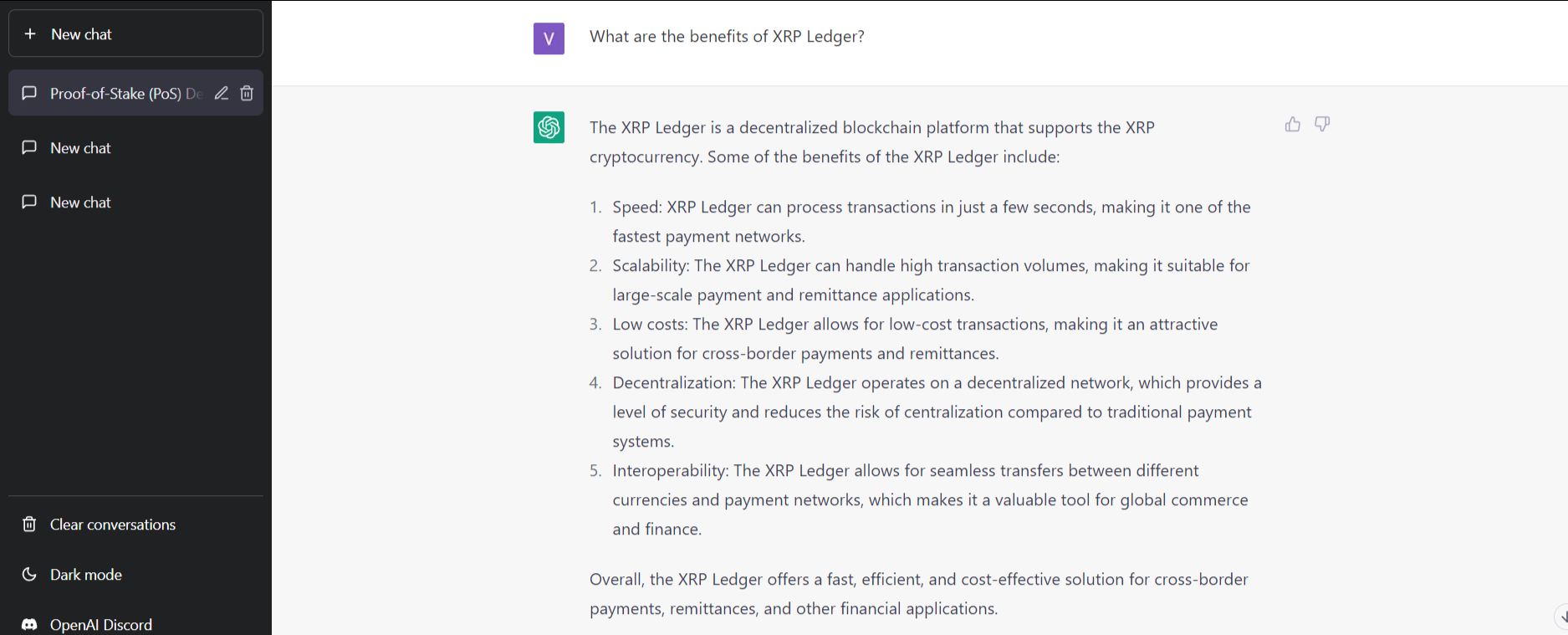
As we can see, the answer looks 100% correct and detailed. However, it is too vague: actually, we can replace XRP Ledger by any blockchain (except maybe first-generation blockchains like Bitcoin and Litecoin that cannot process transactions "in seconds"). As of 2023, XRPL cannot be named among the fastest blockchains. On the other hand, ChatGPT is right about the main commercial advantage of XRPL, i.e., its ability to connect various networks and currencies with each other.
Next, let’s ask ChatGPT one really tricky question. Its answer about the status of proof of stake (PoS) on Ethereum (ETH) looks outdated and might be confusing for some enthusiasts.
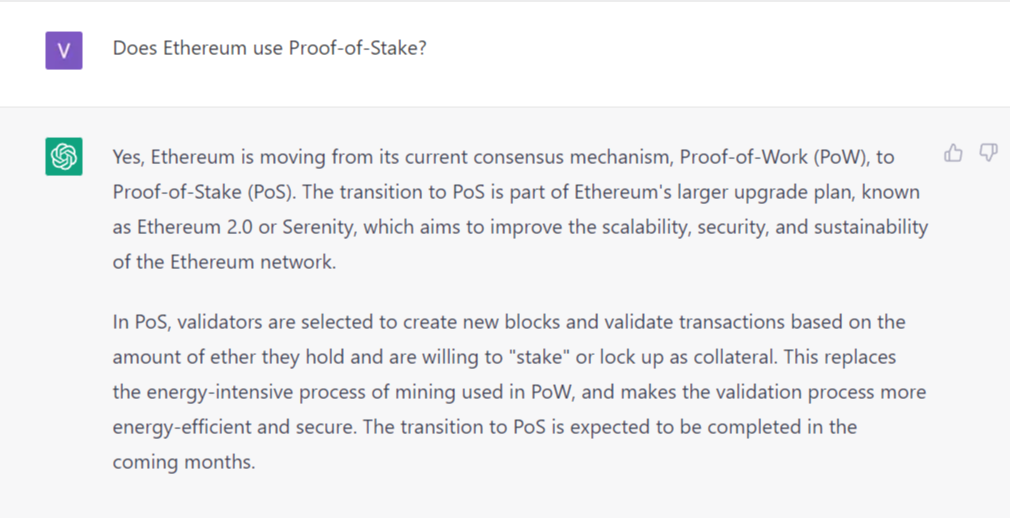
At first, ChatGPT answered "Yes," but then it explained that the network is still on its way to proof of stake (PoS). Meanwhile, in fact, the second largest blockchain completed its transition to a new consensus in September 2022. Also, Ethereum (ETH) developers stopped using "Ethereum 2.0" as a name for the phase of their blockchain's progress. Maybe, this result is derived from the "legacy" articles that were produced in 2021 and earlier.
As such, ChatGPT might be useful for blockchain education, but some of its statements can still be wrong and confusing. Thus, it should be used responsibly by content creators and researchers.
ChatGPT for crypto development
ChatGPT’s ability to streamline the basic operations in blockchain development is another powerful narrative that drives the hype around OpenAI's platform. The most enthusiastic ChatGPT fans even claimed that it is ready to replace junior Solidity developers and DevOps engineers.
Here’s how ChatGPT can solve basic coding tasks in seconds. For instance, let’s ask how to create an ERC-721 token, which is a core standard for Ethereum-based NFTs. To "help" ChatGPT, let’s discuss the process of creating a token with OpenZeppelin, a library of smart contract templates for Ethereum (ETH) and EVM-compatible blockchains.
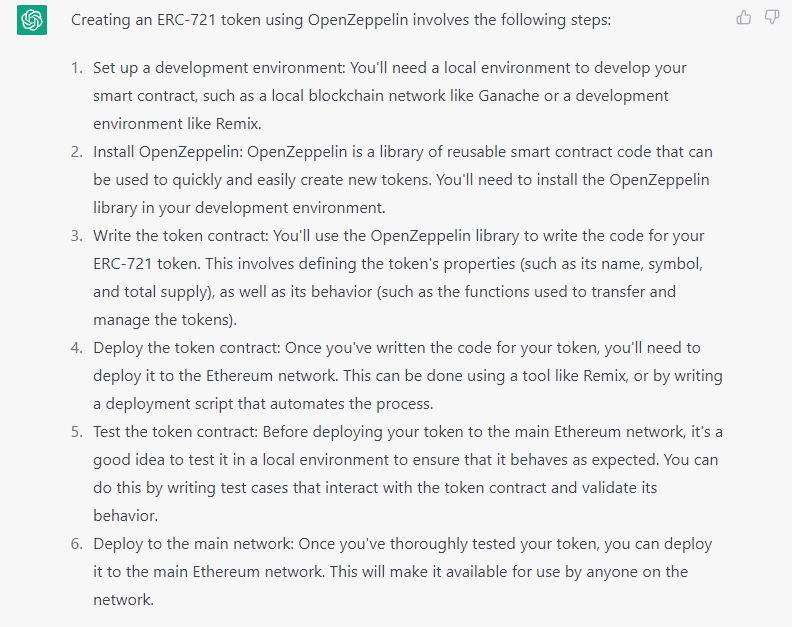
The answer by ChatGPT looks comprehensive and detailed, but actually, it is not useful for those unfamiliar with smart contracts development. An AI-powered bot asks you to "open Remix or Ganache, install OpenZeppelin, write the contract, deploy it to testnet, then test its operations and deploy it to mainnet"; none of these are easy tasks for a newbie developer.
Next, let’s ask ChatGPT to create a sample smart contract for an ERC-20 token, a common standard for Ethereum (ETH) and EVM networks. The chatbot responded with a code for a hypothetical Simple Token (STK).
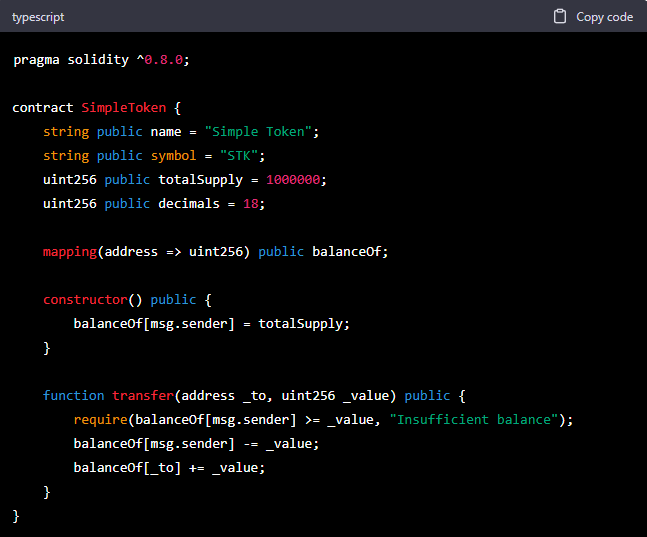
The smart contract is written in Solidity, the main Ethereum (ETH) programming language based on JavaScript. Our sample "STK" asset has its supply capped at one million coins; every single coin is controlled by a creator's address. STK token is created with 18 decimals. ChatGPT equipped this sample with a brief abstract:
This contract defines a token with a fixed supply of 1,000,000 tokens and 18 decimal places. It has a constructor function that assigns the entire supply of tokens to the address that deploys the contract. The contract also implements a transfer function that allows owners of the token to transfer it to other addresses. The function checks that the sender has enough balance before making the transfer.
As such, ChatGPT writes valid smart contracts for a token in seconds: this is the perfect learning opportunity for newbie developers. The code can also be altered and used for testing purposes.
ChatGPT for crypto trading
Just like any other narrative (DeFi "blue chips" in Q3, 2020, meme coins in Q1, 2021, play-to-earn and GameFi tokens in Q3, 2021), the euphoria around ChatGPT has already triggered a spike in the popularity of dozens of tokens somehow associated with artificial intelligence and neural networks.
Here are five tokens that have already benefited from the AI mania in 2023.
- Fetch.AI (FET).
Fetch.AI develops decentralized infrastructure that can connect various applications and mechanisms and empower them with artificial intelligence (AI). Building a proof-of-stake machine learning (ML) network that can be compatible even with protocols that do not use blockchain is Fetch.AI's endgame goal.
Native token FET is used to pay gas fees on the network and serves as a governance token for on-chain referendums.
- SingularityNET (AGIX).
SingularityNET promotes itself as the world’s first decentralized (blockchain-based) AI marketplace that allows everyone to monetize AI-centric tools. SingularityNET allows everyone to choose a suitable AI algorithm for their business and integrate it into a codebase.
SingularityNET benefits from its long-term strategic partnership with the Cardano (ADA) ecosystem. Its AGIX token is an internal cryptocurrency of SingularityNET and can be used as a payment tool for its services.
- Alethea AI (ALI).
Alethea AI is among the first blockchain-based projects with its own proprietary AI technology, i.e., CharacterGPT. It creates human models based on text: for instance, you can request that it emulate "young African American manager," and CharacterGPT will create the interactive model in seconds.
ALI token is an instrument of monetization for Alethea AI products. It also rewards, stimulates and incentivizes various participants of the Alethea AI ecosystem.
- Numeraire (NMR).
Numeraire is the most eccentric project in our review. It addresses AI-powered trading models and rewards model creators for developing automated trading instruments that outperform spot and crypto markets. Numerai's hedge fund is therefore the first-ever hedge fund backed by both the "crowd wisdom" of analysts and the disruptive power of artificial intelligence and machine learning.
Users can get prizes in NMR and stake this asset to "back" their predictions. Numeraire is backed by Union Square Ventures, one of the most prominent VC heavyweights in the Web3 sphere.
- Vectorspace AI (VXV).
Vector Space Biosciences is a platform that organizes research in the sphere of practical application of AI developments. It publishes reports on AI in biomedicine, transport, logistics and so on.
VXV is a form of monetization for Vector Space Biosciences' research and a community token for its supporters.
|
N |
Token name and ticker |
Price, USD (Dec. 1, 2022) |
Price, USD (Feb. 1, 2023) |
Growth |
Market Cap, MM USD (Feb. 1, 2023) |
|
1 |
Fetch.AI (FET) |
0.063 |
0.26 |
312 % |
301 |
|
2 |
SingularityNET (AGIX) |
0.042 |
0.17 |
304% |
240 |
|
3 |
Alethea AI (ALI) |
0.009 |
0.034 |
277% |
126 |
|
4 |
Numeraire (NMR) |
11.5 |
19.66 |
71% |
107 |
|
5 |
Vectorspace AI (VXV) |
0.26 |
0.54 |
108% |
22 |
Also, some low-liquidity coins that explore the AI narrative (for instance, IMGNAI, which is only available on Uniswap and made headlines by allegedly producing AI-generated images of OnlyFans models) rallied by almost 10,000% in less than one month.
Wrapping up
ChatGPT is an AI-powered chatbot created by artificial intelligence innovator OpenAI backed by Sam Altman and Elon Musk. The chat closely mimics the conversation with a human speaker and can answer difficult technical questions.
For Web3 enthusiasts, the chat can be used for educational and training purposes. It can create smart contract primitives, tokens and so on. However, it frequently uses outdated information. Thus, regarding "developing" stories, it is better to check out alternative sources.
The euphoria around ChatGPT has already triggered the rallies of tokens somehow associated with AI development.
 Vladislav Sopov
Vladislav Sopov Dan Burgin
Dan Burgin